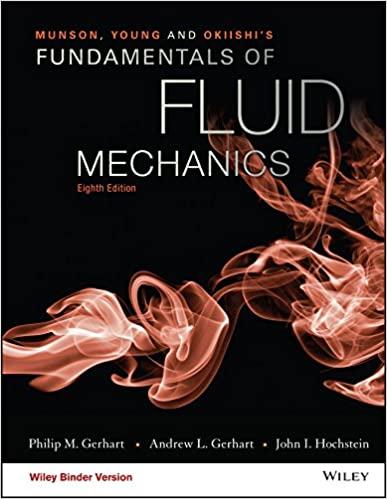The (x) and (y) components of a velocity field are given by (u=x^{2} y) and (v=-x y^{2}).
Question:
The \(x\) and \(y\) components of a velocity field are given by \(u=x^{2} y\) and \(v=-x y^{2}\). Determine the equation for the streamlines of this flow and compare it with those in Example 4.2. Is the flow in this problem the same as that in Example 4.2? Explain.
Example 4.2
Consider the two-dimensional steady flow discussed in Example 4.1, \(\mathbf{V}=\left(V_{0} / \ell\right)(-x \hat{\mathbf{i}}+y \hat{\mathbf{j}})\).
Determine the streamlines for this flow.
Example 4.1
A velocity field is given by \(\mathbf{V}=\left(V_{0} / \ell\right)(-x \hat{\mathbf{i}}+y \hat{\mathbf{j}})\) where \(V_{0}\) and \(\ell\) are constants.
At what location in the flow field is the speed equal to \(V_{0}\) ? Make a sketch of the velocity field for \(x \geq 0\) by drawing arrows representing the fluid velocity at representative locations.
Step by Step Answer:

Munson Young And Okiishi's Fundamentals Of Fluid Mechanics
ISBN: 9781119080701
8th Edition
Authors: Philip M. Gerhart, Andrew L. Gerhart, John I. Hochstein




